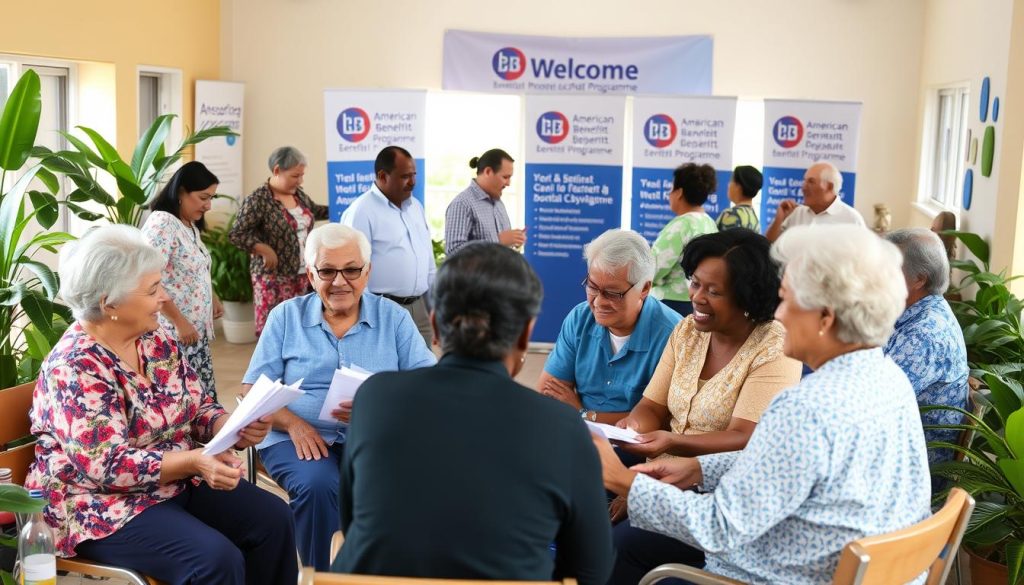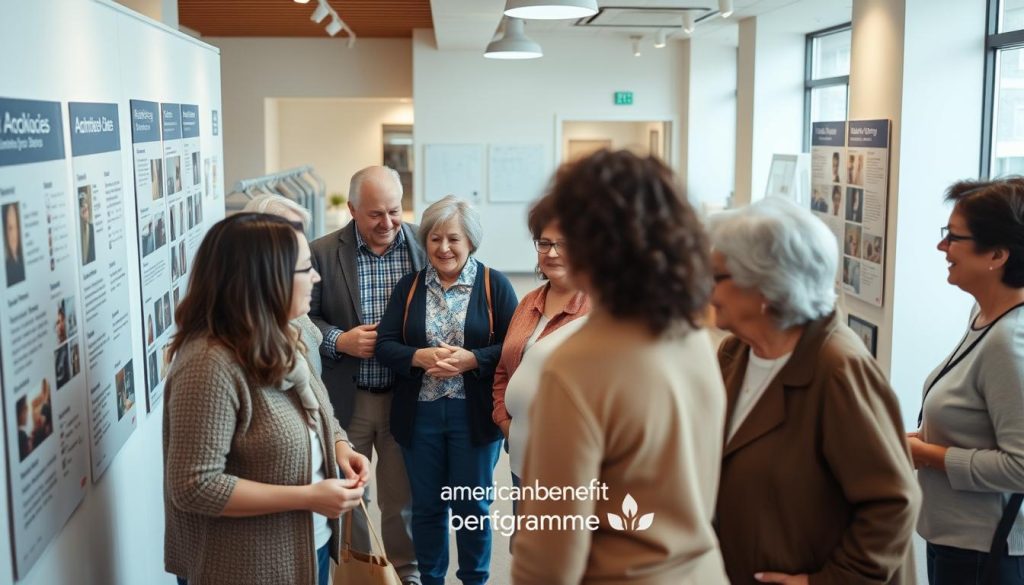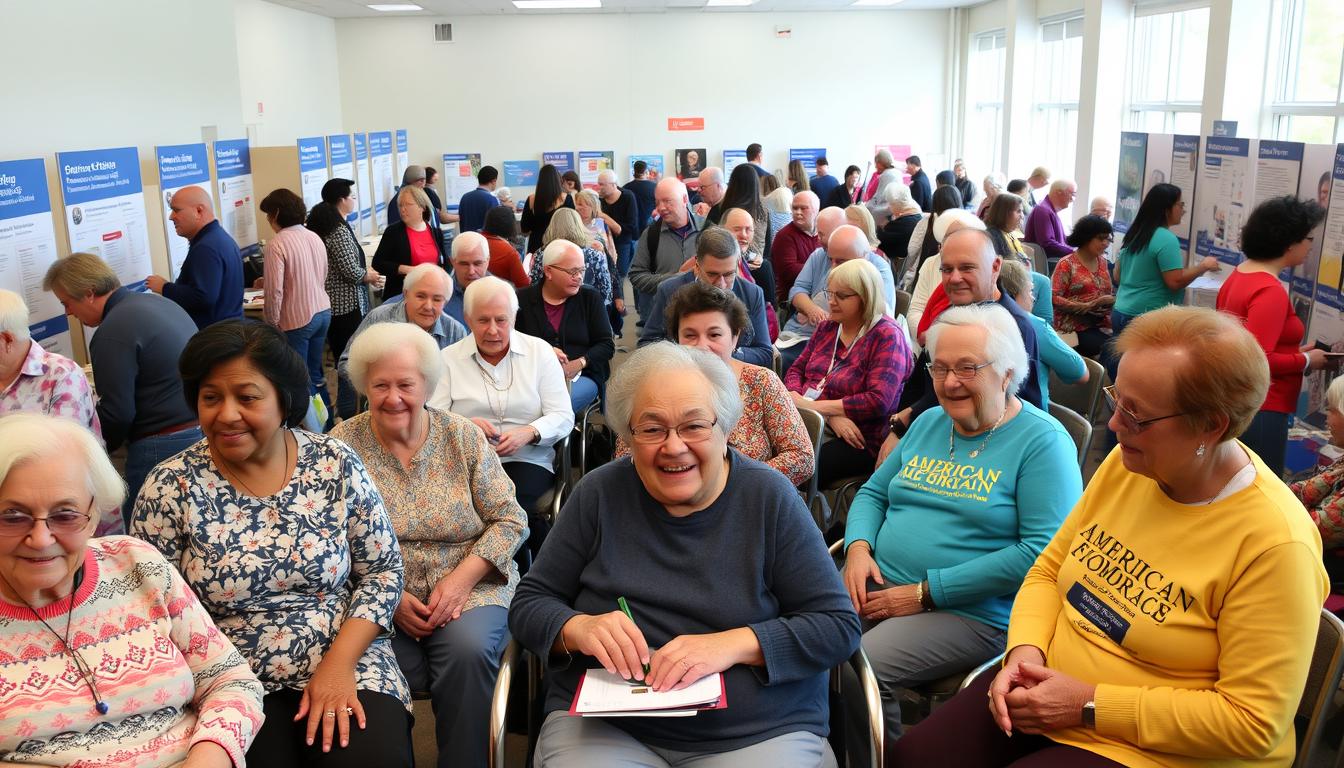Have you wondered why it’s hard for the elderly to get help? Many older people find it tough to figure out how senior programs work. These programs are crucial as they help seniors fight for their rights and handle aging challenges.
In recent years, we’ve seen big efforts to help seniors in many ways. Groups like the National Council on Aging (NCOA) work to make life better for them. They focus on health and money matters, helping seniors since 1950, no matter their income1.
It’s important to know about different senior programs available. This way, older folks can speak up and change policies. With many groups, including AARP and local efforts, there’s stronger support for them2. This article will show how working together can improve seniors’ lives.
Key Takeaways
- Senior advocacy programs are crucial for empowering seniors to voice their needs.
- Organizations like NCOA and AARP play significant roles in elder care advocacy.
- Understanding various advocacy types can help seniors better access resources.
- Local initiatives often address unique challenges faced by the aging population.
- Barriers exist in mental health services and social isolation affecting advocacy effectiveness.
Introduction to Senior Advocacy
Helping seniors speak out is very important. Groups work hard to make sure older people are heard. They tackle big issues like getting good healthcare and stopping elder abuse. This helps seniors live better lives.
Understanding the Importance of Advocacy for Seniors
Standing up for seniors is really important. About 6,700 health workers try to make life better for them3. The Leadership Council has 56 groups helping older Americans3. Also, the National Association makes sure states look out for seniors3. Groups like Area Agencies on Aging spread the word to help and connect seniors4.
The Evolving Needs of the Aging Population
Seniors’ needs change because of new tech and economic shifts. Advocacy programs must adapt to these changes. They focus on challenges like loneliness and health issues. Area Agencies on Aging speak for seniors to important groups4. The AgeOptions Advocacy Task Force works to better benefits and help seniors talk to leaders4.
Importance of Senior Advocacy Programs
Senior advocacy programs help older adults express their needs. They make sure seniors can join in their communities. Older adults then feel heard and valued. Elder care groups let seniors make choices about their lives. This makes their lives better.
Empowering Seniors to Voice Their Needs
Seniors advocacy groups are key for elder communication. They provide a way for older adults to share their problems. This leads to better lives for them. Studies show seniors struggle to get healthcare. They can’t afford it or can’t get to it5. Around 5 million elders in the U.S. can’t get health services6. These programs help fix these issues.
Influencing Public Policy for Elderly Welfare
Advocacy programs shape laws to protect seniors. They help create rules for better access to resources. Many seniors rely just on Social Security6. They need strong financial help. Advocacy also looks at elder abuse, which isn’t often reported6. This work helps make a safer place for elders.

Key Advocacy Organizations Supporting Seniors
It’s important to know how organizations help older people. They give vital help and resources for their needs. This support tackles the challenges seniors face every day.
National Council on Aging (NCOA)
The National Council on Aging (NCOA) is a key advocate for older adults. It aims to improve the lives of 40 million seniors by 2030. NCOA leads in health and financial well-being support.
NCOA works with groups to offer educational stuff and fight for policies that help seniors. They focus on health care and money matters. Their work is key in supporting a growing number of older people with illnesses like Alzheimer’s7.
AARP and Its Role in Senior Advocacy
AARP stands for the American Association of Retired Persons. It fights for seniors’ rights and needs. AARP has worked for over 20 years on big issues like health care and saving for retirement8.
AARP helps people learn how to speak up about their concerns. It does more than just speak for members. AARP pushes for laws and changes to make seniors’ lives better8.
This makes AARP a big part of the fight for older people’s rights. Together with other groups, it works hard to protect and improve senior’s lives.
Exploring Senior Advocacy Programs Available
Senior advocacy programs help improve life for older folks. They address their needs. Understanding types of senior advocacy programs is key for seniors and families. They can find the right senior support services. These services tackle many challenges. Programs include government, nonprofits, and community groups. They focus on healthcare, financial help, and legal aid for seniors. The advocacy resources they offer can truly change senior lives.
Types of Senior Advocacy Programs
There are many types of senior advocacy programs. They range from local to national efforts. Notable programs cover various needs:
- Healthcare advocacy gives access to medical services and education.
- Financial assistance helps seniors manage their money and expenses.
- Legal aid makes sure seniors’ rights are protected.
These programs aim to support and empower seniors. They raise awareness and provide needed resources. For instance, the Older Americans Act helps seniors live with dignity and independence. It has made a difference for over 59 years9.
Accessing Resources for Seniors
It’s important for seniors to find the right senior support services. Advocacy groups give info on healthcare, financial aid, and community help. Workshops, seminars, and helplines connect seniors to support. This improves their life. Yet, some seniors struggle to get healthcare. About 30% don’t have good access.
Money worries are also big. About 50% of seniors don’t have enough savings. And 45% are hit hard by healthcare costs10.

Advocacy programs and resources are crucial for seniors. They help older adults through different life stages. By joining these programs, seniors can feel better and more independent every day910.
Local vs. National Advocacy Efforts
It is very important to know how local and national advocacy efforts differ. Local senior advocacy focuses on solving community issues. They work closely with groups like Elder Rights Advocacy to help seniors. This way, they make seniors’ lives better.
Local initiatives provide vital services such as transportation and wellness programs. They focus on the elderly’s specific needs. By working closely with the community, they quickly solve issues like loneliness. Funding from sources like the Older Americans Act supports these important programs. This close connection helps them quickly meet seniors’ changing needs.
Benefits of Local Initiatives
Local groups know the community’s specific needs. They build strong ties among seniors, helpers, and policy makers. This makes sure problems like mental health are quickly dealt with. These efforts get support from many places, including the Older Americans Act. It funds programs that help seniors a lot.
Working closely with seniors, local groups quickly respond to their needs. This makes their programs more effective. They get to see the benefits of their work firsthand. This close bond makes a big difference in seniors’ lives.
Impact of National Programs
National groups like the NCOA and AARP are very important. They help make laws better for seniors’ health and safety. These groups aim for big changes that help many people. About 11,000 senior centers offer services to millions each year. National groups speak up for seniors, making sure their needs are heard.
They aim to bring about big changes for seniors across the country. This helps with things like health care and safety from abuse. For more on senior advocacy, check this link11.
Barriers to Effective Advocacy
Advocacy for seniors hits several big roadblocks, especially in mental health. Many older adults face barriers to advocacy. These limit their access to vital help. These hurdles greatly affect their life quality. To improve advocacy, we must tackle these issues.
Challenges in Mental Health Services for Seniors
Getting mental health services for seniors has many hurdles. Issues include societal views, high costs, and not knowing about help. Many seniors don’t seek mental health care. The reason is the bad views and the costs they fear. The stigma around mental health stops many from getting elderly support services. This makes their problems worse. It causes big advocacy limitations in this area.
The Role of Social Isolation in Advocacy Limitations
Being isolated affects how well seniors can fight for what they need. Many feel lonely and cut off. This makes it hard for them to push for changes. Breaking down this isolation is key. It helps not just the seniors but makes them more powerful in advocacy. Programs that help them connect can lessen isolation. This encourages them to be part of their communities. It makes advocacy more effective.
Strategies for Effective Senior Advocacy
Advocating for seniors means helping them speak out and make real changes. Organizations can teach them how to talk to those in power. Knowing about the rules and help available lets the elderly fight for their rights.
Policy Advocacy Tips for Seniors
Seniors can really help bring about change. Here are things they can do to make advocacy better:
- Speak up at town hall meetings to share what’s important to you with leaders.
- Learn to write powerful letters asking for changes that help seniors live better.
- Getting together with local groups makes your voice even louder and stronger.
- Keep up with laws and issues that affect older people and their health care.
- Use sites like Facebook or Twitter to tell more people about senior issues.
Improving Healthcare Access
It’s super important for seniors to get to the doctor easily. Some older people have trouble getting the health care they need. Fighting these issues helps seniors get better health care:
- Support cheaper health insurance so seniors don’t have to worry about costs.
- Push for checks that can find health troubles early on, which helps a lot.
- Make sure doctors understand and respect all different cultures to help everyone.
- Tools like canes and hearing aids can help seniors live on their own more easily12.
Working with groups that help people with disabilities can make a big difference12. Seniors should know how to stand up for themselves. This leads to better rules and communities for everyone.
Creating chances for older adults to make friends is key to a happy life12. Being alone can make health problems worse. It’s very important to tackle these problems to help seniors live well.
| Advocacy Strategy | Benefits |
|---|---|
| Participate in Local Meetings | Talk directly to those who make decisions. |
| Create Advocacy Groups | Join forces for a bigger impact. |
| Promote Preventive Care | Better health for everyone. |
| Utilize Technology | Helps seniors with disabilities be more independent. |
| Foster Social Connections | Helps avoid loneliness and boosts mental health. |
Being active in advocacy means we can build communities where everyone is welcome and seniors get the care they need. These actions are the foundation of good elder care and fair health treatment.
Advocacy works to change the way people think and act about older adults, who need more support13.
Getting Involved with Advocacy Groups
Volunteering with groups for seniors means you can really make a difference. You can help by being part of activities aimed at helping older adults. These volunteering opportunities in senior advocacy range from helping at events, to outreach efforts, to mentoring in senior volunteer programs.
Volunteering Opportunities in Senior Advocacy
Working with advocacy groups for seniors is fulfilling. It supports projects that aim to improve seniors’ lives. By volunteering, you don’t just help out; you also spread the word about issues affecting seniors. Learn more about senior services. It’s a chance to connect more and help seniors stand up for what they need.
Advocating for Senior Rights through Collective Efforts
When we come together for seniors’ rights, our collective voice gets louder. Teaming up can shine a light on key senior issues. This teamwork leads to better awareness, altered policies, and better programs for seniors. Everyone’s effort makes a big difference in the community, making sure seniors’ rights are respected. Volunteering drives this big change, impacting seniors’ lives for the better.
Conclusion
Helping older people stand up for their rights is very important. The number of older adults is growing fast. This makes it very important to help them with problems like not having enough money and being treated badly14. Older people can make big changes if they speak up together. Studies show that when they do, they learn a lot about how to get help15.
We also need to make sure older adults are safe and can do things on their own. There are groups working to make older people less likely to fall. They check homes for safety and teach people how to avoid falls16. When we all support older adults’ rights, we help make new laws. These laws make healthcare easier to get, offer better financial help, and protect against bad treatment.
In the end, supporting older adults does a lot of good for everyone. It makes our communities better places for them to live. By focusing on helping them, we respect their worth and freedom. We also make sure everyone knows how valuable and important they are. Putting money and effort into helping older adults is key to looking after their rights and happiness14.
Source Links
- Senior Rights: A Guide to Effective Advocacy
- Senior Advocacy Groups
- Aging and Disability Advocates and Service Providers
- Advocacy – AgeOptions
- The Importance of Senior Advocacy
- The Importance of Senior Advocacy
- Advocacy Resources | Southern Gerontological Society
- Aging Care Advocates
- Senior Rights: A Guide to Effective Advocacy
- Senior Advocacy
- Elder Rights Advocacy
- Empowering Seniors with Disabilities: Advocacy and Support Strategies – Pathways Home Health and Hospice
- adv-w-op.indd
- Elder Advocacy: Standing Up for Senior Rights – Stepping Up For Seniors
- Engaging older adults as advocates for age-friendly, walkable communities: The Senior Change Makers Pilot Study
- Advocacy for Older Adults | High Country Area Agency on Aging

Leave a Reply